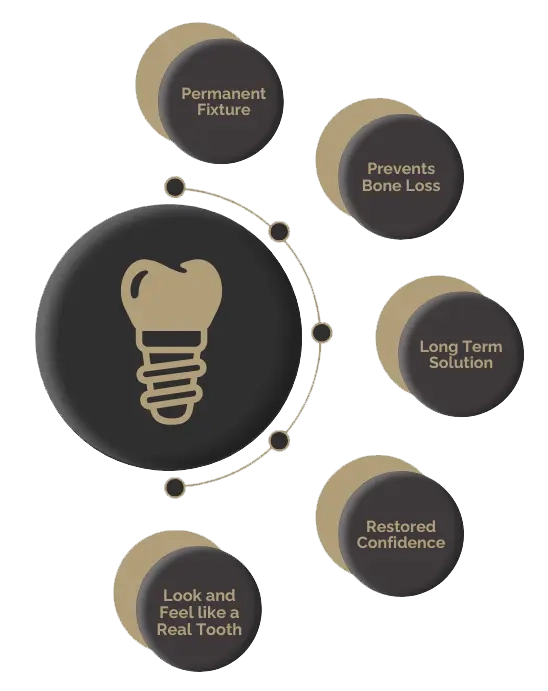


































Treatment with dental implants is a safe, reliable and well-proven solution for permanently replacing one or more missing teeth. They are the gold standard solution for replacing missing, damaged or broken teeth.
Millions of people around the world have received dental implants as a long-term solution for renewed quality of life.
Dental implants are small titanium screws that integrate with the jawbone, becoming the foundation for new replacement teeth.
You can laugh and eat with confidence with teeth that are securely held in place by dental implants


Dental implants have many benefits over other methods that make them a viable solution for you:
1
An initial consultation with our treatment co-ordinator or Dr Sabir will allow you to discuss your concerns and smile goals. We will discuss all the options available to you and outline the step-by-step process needed to achieve your dream smile.
2
During the assessment, Dr Sabir will do a full assessment of your mouth and may take some photographs. This helps us to plan for implants and to decide exactly where they need to be placed.
We will also arrange a 3D CBCT scan to help us understand exactly how much bone you have.
We will talk you through exactly what will happen before, during and after the procedure, and give you a detailed treatment plan.
3
The dental implant procedure is a straightforward procedure that’s usually done under local anaesthetic and its relatively pain-free. If you do feel nervous, we may be able to offer sedation to put your mind at ease.
4
Once you’ve had the implant placed, it’s normal to wait between 3-4 months for the implant to fully bond with your jawbone.
Once it’s healed, your permanent replacement tooth or teeth can be fitted, which are custom-made to fit the size, shape and colour of the teeth they’re replacing.
5
During and after the treatment, we’ll give you all the aftercare advice you need to help you look after your implants. It’s important to follow the aftercare instructions carefully.
We will also advise when you need to see your dentist and hygienist for follow-up appointments, to make sure your implants are secure and healthy.

From the moment you walk into this dentist you are met by the most calm & soothing environment. Staff Lilly & Mel ensure you are as comfortable as you can be. They kept me at ease and provided me with as much information & advice I needed to provide the most positive visit. Thank you.
L Roberts






Anyone who has lost a tooth or several teeth is a candidate for dental implants.As long as a full assessment is completed and treatment is planned properly and tailored to suit the individual’s specific requirements, then dental implants can usually be placed. Patients are assessed on an individual basis; every patient will have a thorough consultation using a combination of radiographic and diagnostic techniques, with an in depth analysis of their lifestyle and objectives.
Once you start losing teeth, your jawbone can start shrinking away quite rapidly, so patients in need of dental implants may first require bone grafting to build and strengthen the jawbone again. It is a common technique that we carry out routinely to create additional height or width of bone into which to place dental implants. Bone is placed via a minor surgical procedure and forms a matrix whereby the grafted bone and your own bone fuse together to provide a very strong platform into which implants can be placed. Often, we can carry out bone grafting at the same time as implant placement, which negates the need for an additional procedure. We use different types of bone including human (your own or donated), synthetic or irradiated bovine bone. The type of bone we use depends on the complexity of your case, which we would discuss with you in your consultation.
Yes, periodontal patients can have dental implants. However, it is important the gum disease affecting your remaining natural teeth is adequately treated before implant placement. It is also important to note that the risk of complications related to implant treatment seems to be somewhat higher in periodontal patients, but with regular maintenance, it is not a contraindication.
Despite advances in modern dentistry some teeth may have reached a stage where no treatment can save them. It is often best to remove them at an early stage, particularly if you are thinking of having implants so as to prevent further bone loss. We would need to treat or remove all pre-existing oral infection wherever possible.
Implants have high success rates and there are reports that have assessed their performance over a period of more than 25 years. The most recent studies indicate that 90% of implants placed ten years ago are still functional today. The long-term success of implants also depends greatly on how well they are cleaned and maintained. In most cases, as a minimum, an annual check-up and regular hygienist visits are recommended so the implants can be professionally cleaned. Moreover, brushing and flossing at home is of paramount importance.
Implant placement is a minor surgical procedure, and some patients can expect minor bruising or swelling following treatment, but this is not the case for every patient. Most patients have likened the aftereffects of implant placement to tooth extraction, in that you will experience soreness or mild discomfort in the 24-36 hours following surgery, but it would not be described as ‘pain’. During the procedure we use local anaesthetic to numb the area to ensure that the procedure is comfortable throughout.
It is very common to find that the softer bone in the area above the upper back teeth is very shallow and not suitable for normal implant procedures. To solve this problem a procedure known as a “sinus augmentation” or “sinus lift” was developed. Bone may be successfully grown in the sinus spaces above your upper back teeth allowing implants to be placed.
Is dental fear and phobia preventing you from having your perfect smile with dental implants? We understand that a visit to the dentist can be quite challenging. We believe everybody deserves a smile that is healthy and happy and we are committed to working with you to help get treatment. That’s why we have adopted a relaxed and informal approach that helps put our patients at ease. Moreover, we offer dental sedation to ensure you never skip your next dental appointment again. Dr Nadeem Sabir provides patients treatment with Intravenous Sedation, which involves the controlled delivery of a sedative drug, which quickly induces feelings of deep relaxation and peace. Further, this leaves you with little or no recollection of the procedure. Intravenous sedation is not like a general anaesthetic, in that you do not lose consciousness. We have been able to help many patients finally overcome dental anxiety by providing them the dental treatment they need using a relaxed and calming approach.

Transform your life with dental implants by Dr Sabir
designed and maintained by dentopia marketing
All rights reserved 2025 © Dr Nadeem Sabir | Terms Of Use | Privacy & Cookie Policy